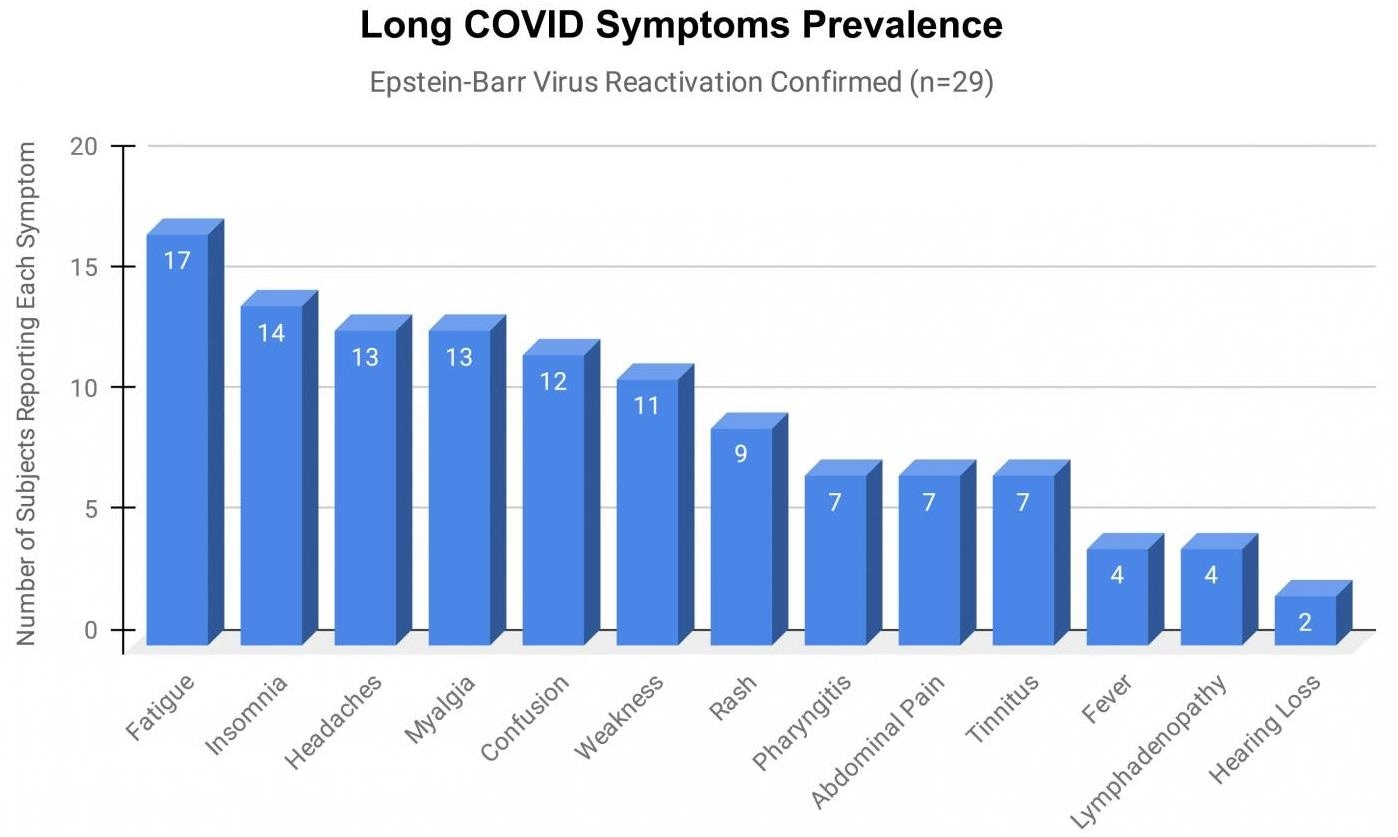Reviewed by Dan Hutchins, M.PhilJun 25 2021
Long COVID symptoms, such as weariness, brain fog, and rashes, may be caused by Epstein-Barr virus (EBV) reactivation because of the inflammatory response to coronavirus infection, which occurs in about 30% of individuals following recovery from initial COVID-19 infection.

The number of subjects reporting each of 13 clinical manifestations of long COVID. Image Credit: Jeffrey E. Gold, Ramazan A. Okyay, Warren E. Licht, and David J. Hurley
A recent long COVID study published in the journal Pathogens provides the first data tying EBV reactivation to long COVID, as well as an analysis of long COVID prevalence.
We ran EBV antibody tests on recovered COVID-19 patients, comparing EBV reactivation rates of those with long COVID symptoms to those without long COVID symptoms. The majority of those with long COVID symptoms were positive for EBV reactivation, yet only 10% of controls indicated reactivation.”
Jeffrey E. Gold, Study Lead Author, World Organization
After initially recovering from SARS-CoV-2 infection, the researchers surveyed 185 randomly selected patients who had recovered from COVID-19 and discovered that 30.3% of them had long-term symptoms consistent with protracted COVID. Several patients with initially asymptomatic COVID-19 cases developed long-term COVID symptoms because of this.
The researchers discovered that 66.7% of lengthy COVID individuals versus 10% of controls were positive for EBV reactivation based on positive EBV early antigen-diffuse (EA-D) IgG or EBV viral capsid antigen (VCA) IgM titers in a subgroup of 68 COVID-19 patients randomly selected among those surveyed. Fisher’s exact test revealed a significant difference (p 0.001).
We found similar rates of EBV reactivation in those who had long COVID symptoms for months, as in those with long COVID symptoms that began just weeks after testing positive for COVID-19. This indicated to us that EBV reactivation likely occurs simultaneously or soon after COVID-19 infection.”
David J. Hurley, PhD, Professor and Molecular Microbiologist, University of Georgia
This study’s discovery of a link between SARS-CoV-2 and EBV reactivation opens new avenues for long-term COVID diagnosis and treatment. The researchers suggested that individuals who have recently tested positive for COVID-19 should be tested for indications of EBV reactivation, such as positive EBV EA-D IgG, EBV VCA IgM, or serum EBV DNA testing.
If patients show evidence of EBV reactivation, they can be treated early to minimize the intensity and duration of EBV replication, perhaps preventing lengthy COVID.
As evidence mounts supporting a role for EBV reactivation in the clinical manifestation of acute COVID-19, this study further implicates EBV in the development of long COVID. If a direct role for EBV reactivation in long COVID is supported by further studies, this would provide opportunities to improve the rational diagnosis of this condition and to consider the therapeutic value of anti-herpesvirus agents such as ganciclovir.”
Lawrence S. Young, PhD, Virologist, University of Warwick
Young is also the Editor-in-Chief of Pathogens.
Source:
Journal reference:
Gold, J. E., et al. (2021) Investigation of Long COVID Prevalence and Its Relationship to Epstein-Barr Virus Reactivation. Pathogens. doi.org/10.3390/pathogens10060763.